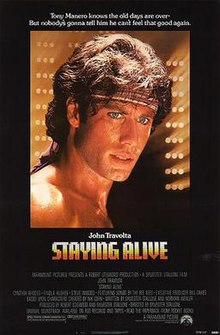Staying Alive (soundtrack album)
| Staying Alive | |
|---|---|

Theatrical release poster
|
|
| Directed by | Sylvester Stallone |
| Produced by | Sylvester Stallone Robert Stigwood |
| Written by | Sylvester Stallone Norman Wexler |
| Starring | |
| Music by |
Barry Gibb Maurice Gibb Robin Gibb |
| Cinematography | Nick McLean |
| Edited by |
Peter E. Berger Mark Warner Don Zimmerman |
|
Production
company |
|
| Distributed by | Paramount Pictures |
|
Release date
|
|
|
Running time
|
93 minutes |
| Country | United States |
| Language | English |
| Budget | $22 million |
| Box office | $64.8 million |
| Staying Alive | ||||
|---|---|---|---|---|
| Soundtrack album by Bee Gees and others | ||||
| Released | June 1983 (US) July 1983 (UK) |
|||
| Recorded | February–March 1983 Middle Ear, Miami Beach, Florida, United States |
|||
| Genre | Rock, soft rock, funk, R&B, new wave, dance | |||
| Label | RSO | |||
| Producer | Bee Gees, Albhy Galuten, Karl Richardson | |||
| Bee Gees chronology | ||||
|
||||
Staying Alive is a 1983 American dance film starring John Travolta as dancer Tony Manero, with Cynthia Rhodes, Finola Hughes, Joyce Hyser, Julie Bovasso, and dancers Viktor Manoel and Kevyn Morrow. The sequel to 1977's Saturday Night Fever, it was directed, co-produced and co-written by Sylvester Stallone. The title comes from the Bee Gees song of the same name, which was used as the theme song to Saturday Night Fever and is also played during the final scene of Staying Alive. The choreography was arranged by Dennon and Sayhber Rawles It also goes hand-in-hand with Tony's new lifestyle, in which he is barely surviving as he pursues his dream of making dancing his career. This is along with Homefront, one of only two films which Stallone has written without being the star (although he does have a cameo).
The film received generally negative reviews from critics, and holds a score of 0% on Rotten Tomatoes as of 2016.
Six years after a previous dance contest, Anthony "Tony" Manero, a former disco king, acts on his brother Frank's advice and his own dreams of dancing professionally. He is now 25 and living in a Manhattan flophouse, working as a dance instructor and waiter at a dance club, searching for a big break in the modern dance productions on Broadway. The break from his Brooklyn life, family, and friends seems to have somewhat matured Tony and refined his personality, including his diminished Brooklyn accent, an avoidance of alcohol and less use of profanity. Other attitudes remain unchanged, such as his disregard for his most recent girlfriend, the forgiving Jackie. Still immature, Tony maintains some of his other macho and childish double standards, such as seeing other women but offended if he sees Jackie with other men.
...
Wikipedia
